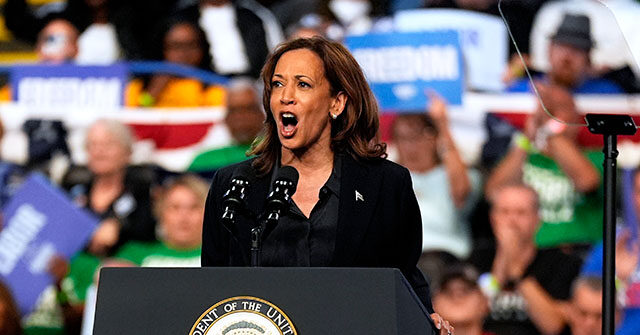During a campaign rally in Flint, Michigan, Vice President Kamala Harris faced a challenging moment when her teleprompter malfunctioned, seemingly leaving her at a loss for words. This incident, which was captured on video and shared widely across social media, began to unfold as Harris repeatedly emphasized that there were “32 days” until the upcoming election. Despite her efforts to motivate the crowd, her attempts quickly became repetitive and awkward, leading to visible discomfort.
The speech took an unexpected turn as she struggled to find her footing without the aid of the teleprompter. Harris’s awkward laughter and incessant repetition of “32 days” became a point of ridicule. Observers noted that her disjointed delivery suggested a lack of preparedness in handling the communication breakdown. Political commentators reacted sharply, labeling her performance as a moment of chaos, with some commentators suggesting that it highlighted her inability to adapt to an unforeseen situation during a crucial campaign event.
Former President Donald Trump’s supporters, particularly his digital war room, seized on the gaffe, describing it as “humiliating” and an indication of Harris’s struggle as a candidate. Their criticism reflects a broader pattern of how political adversaries often exploit mistakes made by opponents in high-pressure contexts. In this instance, Harris’s reliance on scripted lines became apparent, leading to questions about her ability to engage effectively without the usual prompts.
Political strategist Greg Price added to the criticism by commenting on how Harris appeared to flounder until the teleprompter resumed functioning. He remarked on the clear moment when she regained her composure, illustrating how dependent she had been on the scripted content. Price’s commentary underscores a common concern among campaign strategists regarding candidates who struggle to engage spontaneously with voters.
In response to the viral footage, some individuals took a more humorous approach, including cartoonist Rob Larrikin, who created a parody that likened Harris’s speech patterns to those of a drug user. This satire reflects the nature of political commentary in the digital age, where social media allows for rapid dissemination of opinions, often accompanied by humor or ridicule. Such reactions highlight the unforgiving nature of public speaking in a politically charged environment, where even minor missteps can quickly spiral into viral content.
Ultimately, the incident serves as a reminder of the high stakes involved in political campaigning, especially for prominent figures like Harris. As the election approaches, the ability of candidates to convey their messages clearly and effectively becomes increasingly crucial. This moment of vulnerability for Harris may resonate beyond mere humor, representing the pressures that come with the role and the constant scrutiny that politicians face in their public appearances, particularly leading up to a significant election.

